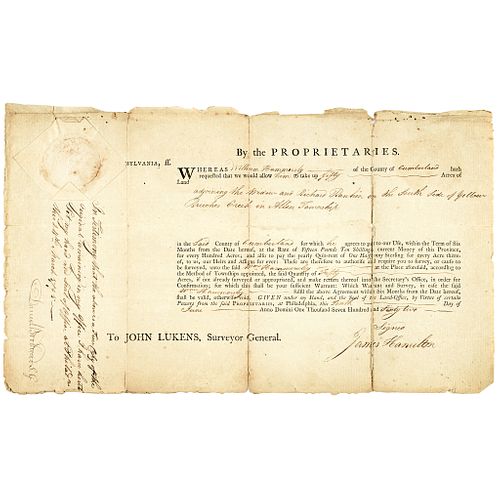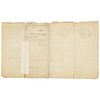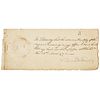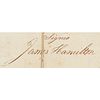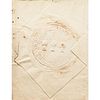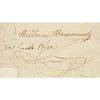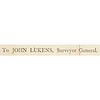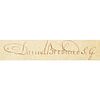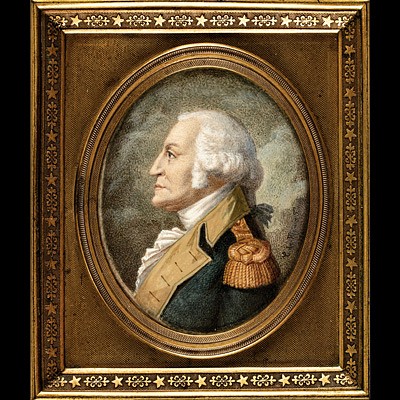1795 General DANIEL BRODHEAD Signed Land Grant
Lot 5
Estimate:
$600 - $800
Absentee vs Live bid
Two ways to bid:
- Leave a max absentee bid and the platform will bid on your behalf up to your maximum bid during the live auction.
- Bid live during the auction and your bids will be submitted real-time to the auctioneer.
Bid Increments
| Price | Bid Increment |
|---|---|
| $0 | $10 |
| $200 | $20 |
| $300 | $25 |
| $500 | $50 |
| $1,000 | $100 |
| $2,000 | $200 |
| $3,000 | $250 |
| $5,000 | $500 |
| $10,000 | $1,000 |
| $20,000 | $2,000 |
| $30,000 | $2,500 |
| $50,000 | $5,000 |
| $100,000 | $10,000 |
| $200,000 | $20,000 |
| $300,000 | $25,000 |
| $500,000 | $50,000 |
About Auction
By Early American History Auctions
May 22, 2021
Set Reminder
2021-05-22 12:00:00
2021-05-22 12:00:00
America/New_York
Bidsquare
Bidsquare : Autographs-Colonial-Political-Americana
https://www.bidsquare.com/auctions/early-american-history-auctions/autographs-colonial-political-americana-6913
302 Lots of Rare, Historic Autographs, Americana, Civil War Era, George Washington, Abraham Lincoln, Slavery & Black History, Revolutionary War Era, Colonial America, Federal Period, War of 1812, Colonial Currency, Indian Peace Medals & more... Early American History Auctions auctions@earlyamerican.com
302 Lots of Rare, Historic Autographs, Americana, Civil War Era, George Washington, Abraham Lincoln, Slavery & Black History, Revolutionary War Era, Colonial America, Federal Period, War of 1812, Colonial Currency, Indian Peace Medals & more... Early American History Auctions auctions@earlyamerican.com
- Lot Description
Autographs
1795 Brigadier General Daniel Brodhead Signed Land Grant
DANIEL BRODHEAD (1736-1809). American Revolutionary War Brigadier General who saw action at Long Island and was with General Washington at Valley Forge, one of the founders of the Society of the Cincinnati.
March 24, 1795-Dated Post-Revolutionary War Federal Period, Partly-Printed Document Signed, "Daniel Brodhead, S.G." (Surveyor General), Philadelphia, Very Fine. This being a Land Grant, 1 page, which measures 7.75" x 13.25", fully issued on fine quality laid period paper, with its full Embossed Paper and Wax Seal intact at upper left. Brodhead certifies that this land document, originally issued in 1762, is a true copy of the original located in his office. The note above is in another hand, written vertically at the left margin, beneath the official paper seal; Brodhead signs very clearly in medium brown ink, his signature measuring a large 2.75" long. Various fold splits, tape repair to one fold on verso, and uneven top margin. In 1775, Brodhead raised a company of riflemen who served in the battle of Long Island. He received the thanks of Congress for two important treaties he made with the Indians, one of them on July 29, 1779, with the Cherokees.
DANIEL BRODHEAD (1736 - 1809). American Brigadier General who saw action at Long Island and was with Washington at Valley Forge. On March 5, 1779, Brodhead replaced McIntosh as commander of the Western Department, and he spent the balance of the war establishing Forts in Western Pennsylvania, Fort Pitt, and fighting against British-allied Indian raiders.
Brodhead was born in Marbletown, New York, the son of Daniel Brodhead III and Hester (Wyngart) Brodhead. Brodhead's father moved his family to what is now East Stroudsburg, Pennsylvania, in 1737. Life in the frontier settlement was difficult, as Native American bands, mostly Lenape and Susquehannock, resisted settlers' encroachment. The Brodhead homestead was attacked by natives numerous times during Daniel's youth.
When his father died in 1755, Brodhead was left with 150 acres from the estate. He sold his land share to brother Garret. This became the residence of the Flory family for many years at 81 North Courtland Street, the oldest home in East Stroudsburg.
Brodhead had a relatively unremarkable career before the American Revolutionary War. He farmed, ran a grist mill, and worked as a deputy surveyor for Pennsylvania.
In the years leading up to the outbreak of hostilities, Brodhead began to take part in the protest movements against British taxation. In 1774, Brodhead was elected to represent Bucks County at a provincial meeting held in Philadelphia on July 15, 1774.
In 1776 as war broke out, Brodhead was commissioned as an officer of the 8th Pennsylvania Regiment of colonial troops with the rank of lieutenant colonel. His first action came at the Battle of Long Island, where he was recognized by George Washington for his bravery and initiative. At the battle, Brodhead's only son, also named Daniel, was wounded and captured. He was later exchanged in 1778, and retired as a Captain in 1779 from the 3rd Pennsylvania Regiment.
Brodhead took over command of the 8th Pennsylvania after the death of its commander, Aeneas Mackay, and was promoted to colonel. Brodhead led his troops during the defense of Philadelphia in 1777 and wintered with the Continental Army at Valley Forge in 1777-79. In April 1778, Brodhead led a successful expedition against the Lenape bands around the Muskingum River in the Ohio Country. In June 1778, Washington sent Brodhead and the 8th Pennsylvania to rebuild and re-garrison the frontier outpost of Fort Muncy, in what is now Northumberland County, Pennsylvania. Brodhead defended local settlers from British-allied tribes.
Brodhead commanded the 8th Pennsylvania in Brig. Gen. Lachlan McIntosh's failed attempt to capture the British stronghold of Fort Detroit. On March 5, 1779, Brodhead replaced McIntosh as commander of the Western Department. His command included frontier forts such as Fort Pitt (Pittsburgh), Fort McIntosh (Beaver, Pennsylvania), Fort Laurens (near Bolivar, Ohio), Fort Tuscarora (near Lisbon, Ohio), Fort Henry (Virginia) (Wheeling, West Virginia), Fort Armstrong (near Kittanning, Pennsylvania), and Fort Holliday's Cove, along with dozens of lesser outposts.
The Wyandot, Mingo, Shawnee, and Lenape allied with the British and regularly raided settlements on the Ohio Country frontier. The British were strong at Fort Detroit and other outposts, and had most of the Iroquois Confederacy as allies. In addition, Brodhead faced a tenuous alliance with Iroquois tribes such as the Oneida who supported the Patriot cause as allies, a large population of Tory-sympathizing settlers, and a delicate truce with the powerful Lenape-Delaware tribe. Its friendly chief had signed a treaty with the US as an ally.
From his headquarters at Fort Pitt, Brodhead directed numerous raids against hostile native tribes, often leading the expeditions personally. His most famous raid came against the Seneca tribe of the Iroquois Confederacy between August 11 and September 14, 1779.
Brodhead left Fort Pitt with a contingent of 605 soldiers and militia to go into northwestern Pennsylvania. He followed the Allegheny River up into New York, where he drove the Seneca out of their villages. As most of the warriors were away fighting the Sullivan Expedition further east in New York, Brodhead met little resistance in destroying the villages, crops and people at the heart of the Seneca nation.
In 1781, some of the Lenape-Delaware ended their neutrality and sided with the British. In retaliation, Brodhead mounted the Coshocton Expedition, invading their territory in central Ohio and destroying the main village of Coshocton in what is now east-central Ohio. As a result of Brodhead's campaign, the Delaware fled from eastern Ohio. They also vowed vengeance.
He retained command of the Western Department until September 17, 1781, when he was replaced by John Gibson. He had turned over command in May 1781, but returned in August and tried to regain control from Gibson, in the process arresting Gibson. However George Washington sent orders which led to Brodhead's permanent removal from command at Fort Pitt. Brodhead was removed from his command over allegations of mishandling supplies and money. Brodhead had made impressment (the forced sale of supplies) a policy. He had spent money intended for bonuses to recruit new militiamen to purchase supplies for his existing troops. Brodhead was acquitted of all charges except misspending the recruiting money.
George Washington had been aware of the impressment and had given his tacit approval, as the Continental Army was struggling to keep going. Furthermore, the court martial ruled Brodhead justified in spending the recruiting money on supplies, and he was not punished.
A short time later, George Washington brevetted him a Brigadier General. Brodhead spent the remainder of the war as commander of the 1st Pennsylvania Regiment. Brodhead was one of the founders of the Society of the Cincinnati.
Our Auction Contents:
Black History & Slavery: (Lots 1 - 63)
Abraham Lincoln Related: (Lots 64 - 74)
Historic Autographs: (Lots 75 - 235)
Colonial America: (Lots 236 - 261)
Revolutionary War: (Lots 262 - 304)
George Washington Related: (Lots 305 - 306)
Early American Guns & Weapons: (Lots 307 - 318) - Shipping Info
-
Early American provides in-house worldwide shipping. Please contact us directly if you have questions about your specific shipping requirements.
-
- Buyer's Premium



 EUR
EUR CAD
CAD AUD
AUD GBP
GBP MXN
MXN HKD
HKD CNY
CNY MYR
MYR SEK
SEK SGD
SGD CHF
CHF THB
THB